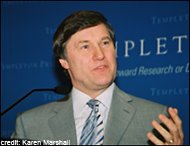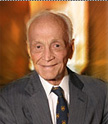Sunday
Mar192006
On Science & Religion - John Barrow Wins the 2006 Templeton Prize
 Sunday, March 19, 2006
Sunday, March 19, 2006  John Barrow, mathematician/physicist from Cambridge University, has been named the winner of the 2006 Templeton Prize.
John Barrow, mathematician/physicist from Cambridge University, has been named the winner of the 2006 Templeton Prize.The Templeton Prize is awarded "for progress toward research or discoveries about spiritual realities." The judges who award the prize favor those whose work leads to communication between scientific and religious spheres. Barrow, a prolific writer (17 books and 400+ articles) often writes about the mysteries of the universe, the nature of physical laws, and mathematical truth. From the Templeton Prize announcement:
The hallmark of his work is a deep engagement with those aspects of the structure of the universe and its laws that make life possible and which shape the views that we take of that universe when we examine it. The vast elaboration of that simple idea has lead to a huge expansion of the breadth and depth of the dialogue between science and religion.Barrow is the author of The Mathematical Universe - a 1989 article that I have used as one of the main readings for the Chaos and Fractals course. This article usually generates very strong student opinions because Barrow describes major philosophy of mathematics movements of the 20th century: realism, formalism, inventionism, and constructivism. The students then write a reflective journal piece on how they would classify their mathematical stance. This is often followed by a lively seminar session whose themes reverberate throughout the semester. (Not surprising, most students have never considered this, and, while most claim to be mathematical realists, there are always one or two each semester that are intrigued by inventionism.)
In particular, Barrow's engagement with frontier science and mathematics, developing multidisciplinary perspectives on subjects such as the mysteries of nothingness and infinity, and the potentially intelligible realms of the laws of Nature and the limits of scientific explanation, has jarred religious and scientific perspectives in such a way as to open pathways of understanding which may allow both to comprehend each other more fully.
I've read 3 of Barrow's books - The Anthropic Cosmological Principle (with FJ Tipler), The World Within the World, and Theories of Everything: The Quest for Ultimate Explanation - and they have all been memorable for their depth and extraordinary range of topics. Barrow is an excellent and provocative writer.
 Barrow has been richly rewarded for his work - The Templeton Prize award is $1.4 million - more than the Nobel prize. Sir John Templeton is a mutual funds pioneer, and is described as "arguably the greatest global stock picker of the century" by Money Magazine.
Barrow has been richly rewarded for his work - The Templeton Prize award is $1.4 million - more than the Nobel prize. Sir John Templeton is a mutual funds pioneer, and is described as "arguably the greatest global stock picker of the century" by Money Magazine.There is also a local angle to this story: the Templeton Prize is administered by the Templeton Foundation, based in West Conshohocken, Pa. The Foundation does much more than just the Templeton Prize, funding other awards, special projects, and lecture series around the world. (See the web site for details, including grant opportunities and application procedures.)
The Foundation takes a carefully-worded stance on intelligent design, attempting to find a middle-ground that is not politically or ideologically compromised. (Click here for the statement.) I'm not sure that the statement succeeds - I believe that it is much more inviting for intelligent-design supporters because of the following claim:
Thus while it is our judgment that the general process ofNevertheless, the entire Templeton effort is a much-needed attempt to bridge the science-religion divide, rather than use the natural division as a polarizing wedge between the two camps. Choosing John Barrow is good evidence that the Templeton program lives up to its stated goals.
biological evolution is well attested by many lines of research, it is not clear to what extent the process of evolution or the study of the history of life on earth may reveal hints of broader cosmic, perhaps even divine, purpose and intention.


Reader Comments